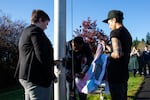Dozens of students and members of the Washington State University – Vancouver community gathered around a flagpole Wednesday squinting towards the sky as an updated transgender flag was raised half-staff for Trans Day of Remembrance.
For 20 years, November 20 has been set aside as a day to honor the lives of people who are transgender and have died as a result of bigotry and violence. This was the first year WSUV commemorated the day.

An updated version of the transgender pride flag is raised to half-staff to commemorate Transgender Day of Remembrance. Black and brown stripes appear on the flag alongside the original blue, pink and white. The added stripes represent black and brown people.
Erica Morrison / OPB
“We have memorialized those who have died, in one way or another over the last couple of years on this campus, but not specifically on this day,” Abigail Soto, queer and trans resource coordinator for the university said.
Gwendolyn Ann Smith, a transgender advocate began the day of remembrance in honor of Rita Hester, a transgender woman who was murdered in 1998. Today the Trans Day of Remembrance commemorates those who have died by suicide or were murdered.
The keynote speech was delivered by Iden Campbell, racial justice and trans justice program director for Basic Rights Oregon.
“Gwendolyn knew what we know today, trans women are dying and it's an epidemic, specifically black women and indigenous trans women,” Campbell said. “We've had a murder in Oregon a couple of years ago, so trans women are being murdered all across the U.S., but on the international level is also an epidemic.”
Related: Portland Police Open Investigation In Death Of Black Transgender Woman
Campbell told the story of his intern, LaShay Myles. She was a transgender woman who was murdered in Washington D.C. in 2011 – an incident that made him become an activist.
“That’s what made me say, ‘you can’t be quiet anymore’,” Campbell said. “Because that’s what I was doing as a black trans man. I was hiding. I was okay with trans women being the voice of the trans community, because trans women wanted their rights...and I was okay with them demanding because I was going to be a person that could also receive from what they were fighting for.”
Campbell’s message was paired with a slideshow of black women who either he knew or knew of while living in D.C.
“Transgender people of color are the ones that face the vast majority of violence worldwide and we wanted to center that reality,” Soto said.
Campbell and Soto memorialized 39 transgender people who were killed or committed suicide within the past year. As the photos flashed on the screen an updated version of the transgender pride flag was passed around in the audience as tearful students paid homage to the lives that have been loss.
Soto said she chose to use a version of the flag designed by Julia Feliz, a Puerto Rican member of the LGBTQ community because it represented the disproportionate violence inflicted on black and brown transgender women. The flag was updated to include a black and brown stripe alongside the original blue, pink and white. The added stripes represent black and brown people.

A photograph of Otis "TeTe" Gulley was displayed on the table among the 38 other reported transgender deaths this year. The photo was labeled "possible suicide." Gulley was found dead in a park in Portland on May 27, 2019. Their death was ruled a suicide by the medical examiner but members of the community believe they were killed.
Erica Morrison / OPB
“It felt disingenuous to us to just go about business as usual. Raise the transgender flag that just has blue and pink and white stripes, although that is a valid flag and has been used for many years now,” Soto said.
“We found this new flag and felt like it better represented what we stood for,” she said.
WSU–Vancouver hosted multiple events throughout the day including self-care activities, workshops and pronouns bingo.
Soto said the purpose of the game is for participants to “get used to using pronouns and various contexts and in a playful way that demonstrates that it's okay to make mistakes that you learn and you pick up and you move on and that we're all still learning.”
